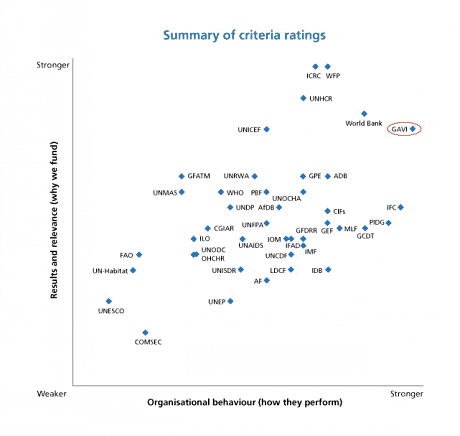
Geneva, 30 March 2012 – The GAVI Alliance has welcomed an Australian Government review that found the global health partnership to be among the world’s top performers in delivering cost-effective results with a measurable life-saving impact.
A strong track record
According to the Australian Multilateral Assessment published today by AusAID, “GAVI has established a strong track record in delivering against its mandate” to save children’s lives and protect people’s health by increasing access to immunisation in the world’s poorest countries.
The assessment follows two similar reviews by the UK and Swedish governments which also awarded GAVI top marks.
The AusAID report rated GAVI “strong” or “very strong” based on its performance in seven categories including strategic management, transparency, cost and value consciousness, partnership behaviour, delivering results, contributing to multilateralism and alignment with Australia’s interests.
“GAVI has consistently been able to demonstrate significant achievements against its strategic goals and overall mandate,” the report said. “By the end of 2011, it is estimated that GAVI-funded vaccines had prevented over 5.5 million future deaths caused by hepatitis B, haemophilus influenzae type b (Hib), measles, pertussis, pneumococcal disease, polio and rotavirus.”
GAVI has consistently been able to demonstrate significant achievements against its strategic goals and overall mandate. Australian Multilateral Aid Assessment |
An alliance
Launched in 2000 as the Global Alliance for Vaccines and Immunisation, GAVI brings together developing country and donor governments, the World Health Organization, UNICEF, the World Bank, the vaccine industry in both industrialised and developing countries, research and technical agencies, civil society, the Bill & Melinda Gates Foundation and other private philanthropists.
“Australia’s multilateral assessment confirms that childhood immunisation delivers measurable results and offers our donors very good value for money in terms of development assistance to the world’s poorest countries,” said Dr Seth Berkley, Chief Executive Officer at the GAVI Alliance, who concluded a visit to Australia earlier this month.
“Almost one third of GAVI support is focused on supporting Australia’s neighbours in the Asia-Pacific region. I commend AusAID and the Australian Government for undertaking this timely assessment which will ensure that taxpayers money is targeted at those multilateral agencies that make a real difference in the world, with the most cost-effective impact.”
“We are pleased to see that GAVI is rated highly but stress that we continue to strive to improve our public-private model further so we can provide our donors with even better results and empower developing countries to immunise all their children with the best vaccines available. As a learning organisation, we also note that this assessment has highlighted areas where we could do more to improve our performance,” he added.
A global leader
Australia is a global leader in development aid and has committed to spend 0.5 % of GDP on aid programmes by 2015. In recent years, with bi-partisan support, it has been increasing core funding to a range of high-performing multilateral organisations.
Australia has been a GAVI donor since 2006 and contributes to the Alliance through direct contributions and via the International Finance Facility for Immunisation (IFFIm), an innovative finance mechanism which raises funds for immunisation on the international capital markets.
In 2009, Australia announced a 20-year commitment to IFFIm totaling Australian $250 million. In June 2011, it announced new multi-year funding of Australian $200 million over the three year period 2011-2013.
The assessment also recognized GAVI’s careful attention to gender and other cross-cutting issues and welcomed new efforts to measure the impact of gender on access to immunisation services. It recommended that GAVI could also look at how it could use a similar approach to measure its impact on people with disabilities.
“The outcome of this assessment is inspiring to all of us involved in the work of the GAVI Alliance,” said Dagfinn Høybråten, Board Chair of the GAVI Alliance. “The GAVI Board is grateful to the Australian Government not only for this thorough review of our work and its ongoing support, but also for its global vision and leadership in international development assistance.”
